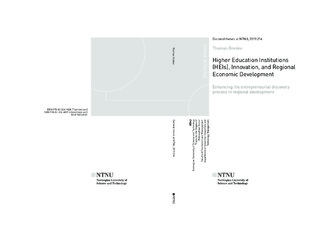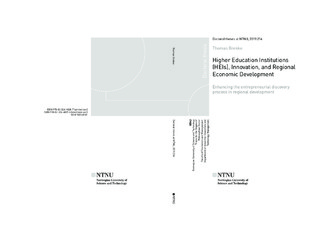| dc.contributor.advisor | Levin, Morten | |
| dc.contributor.advisor | Herstad, Sverre Johan | |
| dc.contributor.author | Brekke, Thomas | |
| dc.date.accessioned | 2019-10-10T07:00:10Z | |
| dc.date.available | 2019-10-10T07:00:10Z | |
| dc.date.issued | 2019 | |
| dc.identifier.isbn | 978-82-326-4029-4 | |
| dc.identifier.issn | 1503-8181 | |
| dc.identifier.uri | http://hdl.handle.net/11250/2621301 | |
| dc.description.abstract | Summary of the thesis
This thesis is motivated by the observation that higher education institutions (HEIs) are currently been challenged in new ways to respond and transform to support the transition of regional and national economics. This study discusses how can higher education institutions (HEIs) enhance regional capabilities for innovation? The dissertation pursues two objectives. From a practical perspective, it aims to increase our knowledge of how the HEI contribution towards innovation and regional development is able to change the regional condition for industry development. From a theoretical perspective, it seeks to increase our understanding of how regions develop and change, with an emphasis on the heterogeneity and complexity of regional path dependent processes and the evolutionary processes of firms’ novel ways of searching for knowledge.
The thesis draws from a longitudinal case study focused on the transition of Vestfold University College (currently the University of south-eastern Norway) from 1994 - 2016. The thesis research is conducted withina critical realist tradition and follows an explorative approach through use of a mix-method that combines longitudinal qualitative and quantitative research designs.
The study shows that HEIs can build capabilities for innovation by reorienting a region’s knowledge base and the regional framework conditions for industry development within a specific region and industry in four ideal ways; 1) stimulating the spin-off and commercialisation of knowledge, 2) attracting external investment, 3) diversifying existing industry structure, and 4) upgrading the existing industry structure knowledge base. The capability of HEI to reorient regional conditions for industrial development are shown to be primarily discontinuous and shaped by the technological and market breakthrough from entrepreneurial actors and new policy schemes, and by mobilising industry resources in joint efforts to create new work forms for teaching, and combining teaching and research in new ways linked to third mission activities, that is, enhancing the entrepreneurial discovery process. The dissertation draws attention to the effect of a firm’s novel means of searching for knowledge, in the global-local context, on local path dependent processes and HEI capabilities for innovation. The thesis also demonstrate the tension between the politicians’ ambitions for HEIs and the realities that faced by HEI as well as firms in local development processes. | nb_NO |
| dc.description.abstract | Sammendrag av avhandlingen
Avhandlingen analyserer høyere utdanningsinstitusjoners evne til å omstille seg for å støtte opp under regionale og nasjonale utviklingsprosesser. Det sentrale spørsmålet er hvordan kan høyere utdanningsinstitusjoner forbedre regionale forutsetninger og vilkår for innovasjon og næringsutvikling? Avhandlingen har to målsetninger. Fra et praktisk perspektiv søker den å øke vår kunnskap om hvordan høyere utdanningsinstitusjoner bidrar til innovasjon og hvordan regional utvikling kan endre de regionale forholdene for industriell utvikling. Fra et teoretisk perspektiv søker avhandlingen å øke vår forståelse av hvordan regioner utvikles og endres, med en vektlegging på heterogeniteten og kompleksiteten i regionale stiavhengige utviklingsprosesser samt bedrifters kontinuerlige søken etter ny kunnskap.
Det empiriske arbeidet består av en langsgående casestudie av Høgskolen i Vestfold (for tiden Universitetet i Sørøst Norge) fra perioden 1994 til 2016. Forskningsarbeidet er forankret i aksjonsforskning og en kritisk realisme tradisjon med bruk av mix-metode som kombinerer både kvalitativ og kvantitativ forskningsdesign.
Funn i fra avhandlingsarbeidet viser at høyere utdanningsinstitusjoner kan utvikle regionale kapabiliteter for innovasjon ved å reorientere regionens kunnskapsbase og endre rammebetingelsene for næringsutvikling innen fire ideelle måter: 1) stimulere spin-off og kommersialisering av kunnskap, 2) tiltrekke eksterne investeringer, 3) diversifisere eksisterende næringsstruktur og 4) oppgradere den eksisterende kunnskapsbasen i regionen. Evnen høyere utdanningsinstitusjoners har til å reorientere en regions kunnskapsbase påvirkes av ny teknologi, markedsendringer, politiske føringer. Avhandlingen viser også at evnen disse institusjonene har til å mobilisere lokale ressurser form av en «entrepreneurial discovery process» i den hensikt å utvikle nye tilpassede undervisningsformer som kombinerer undervisning og forskning gjennom eksperimentering og utprøving. Avhandlingen setter også søkelys på spenningen mellom politiske ambisjoner for høyere utdanning og de realiteter som høyere utdanningsinstitusjoner møter i regionale utviklingsprosesser. | nb_NO |
| dc.language.iso | eng | nb_NO |
| dc.publisher | NTNU | nb_NO |
| dc.relation.ispartofseries | Doctoral theses at NTNU;2019:216 | |
| dc.relation.haspart | Paper 1:
Brekke, Thomas.
Entrepreneurship and path dependency in regional development. Entrepreneurship and Regional Development 2015 ;Volum 27.(3-4) s. 202-218
- In not included due to copyright available at
https://doi.org/10.1080/08985626.2015.1030457 | |
| dc.relation.haspart | Paper 2:
Herstad, Sverre Johan; Brekke, Thomas.
Globalization, modes of innovation and regional knowledge diffusion infrastructures. European Planning Studies 2012 ;Volum 20.(10) s. 1603-1625
- In not included due to copyright available at
https://doi.org/10.1080/09654313.2012.713334 | |
| dc.relation.haspart | Paper 3:
Brekke, Thomas.
Building entrepreneurial discovery process from university–industry interaction. | |
| dc.relation.haspart | Paper 4:
Brekke, Thomas.
What do we know about the university contributions to regional economic development?
A conceptual framework | |
| dc.title | Higher Education Institutions (HEIs), Innovation, and Regional Economic Development : Enhancing the entrepreneurial discovery process in regional development | nb_NO |
| dc.type | Doctoral thesis | nb_NO |
| dc.subject.nsi | VDP::Social science: 200::Economics: 210 | nb_NO |

